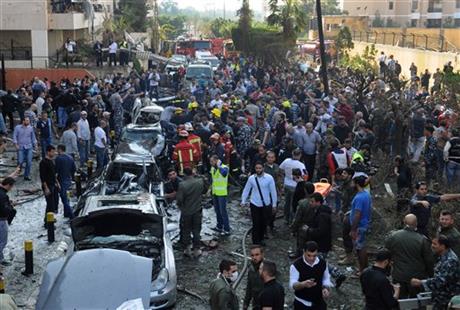
By DIAA HADID
Lebanese citizens and security forces gather near the entrance of the Iranian embassy, background, where two explosions have struck, in Beirut, Lebanon, Tuesday Nov. 19, 2013. Twin suicide bombings struck outside the Iranian Embassy in the Lebanese capital on Tuesday, killing nearly two dozen, including the Iranian cultural attaché, and wounding dozens more in one of the worst bombings to target the predominantly Shiite area in southern Beirut. (AP Photo/Ahmad Omar)
BEIRUT (AP) — A pair of suicide bombers targeted the Iranian Embassy in Beirut on Tuesday, killing some two dozen people and leaving corpses, puddles of blood and burning cars strewn across an upscale, Shiite-dominated neighborhood of the capital.
The bombings were the latest in a string of attacks against strongholds of the Shiite militant Hezbollah, as the war in neighboring Syria bleeds into its tiny coastal neighbor. The blasts underscore the ever-growing sectarian nature of the conflict and highlight how regional involvement in the Syrian crisis is blowing back in a myriad of ways.
___
WHY WOULD THE IRANIAN EMBASSY BE ATTACKED?
Shiite-majority Iran is a chief ally of Syria’s ruler, Bashar Assad, who is fighting against largely Sunni Muslim rebels seeking to overthrow him. Assad himself is a member of Syria’s minority Alawite sect, an offshoot of Shiite Islam. Iran has helped supply the Syrian regime with weapons, military training and diplomatic support. The Iranian-backed Hezbollah has sent fighters into Syria, helping Assad’s military score key victories over the rebels, who have repeatedly threatened to strike back. Iran and Hezbollah have a particularly important stake in the Syria conflict, because they fear extremist Sunni Muslims will ultimately come to power if Assad is defeated.
WHAT IS THE REGIONAL CONTEXT?
The attack appears to be another strike in the proxy battles that have played out in the region for decades, now intensified with the civil war in Syria. While Iran supports the Assad government, Gulf Arab countries led by Sunni powers Saudi Arabia and Qatar have been chief supporters of the rebels fighting to topple him. The Syrian government, and some Hezbollah officials, indirectly blamed Saudi Arabia for Tuesday’s attacks. The Syrian government said the attack “reeked of petro-dollars.” The Syrian government regularly accuses Saudi intelligence of providing financial support and weapons to the rebels, although it has not produced credible evidence to support the claims.
WHO CLAIMED THE BOMBINGS, AND WHAT DOES THAT MEAN?
A Lebanese al-Qaida-linked Sunni extremist group claimed responsibility for the attack, underscoring how far across the region Syria’s war has spread and how sectarian it has become. The Abdullah Azzam Brigades said more attacks would follow unless Hezbollah withdraws its fighters from Syria. Such claims are likely to reinforce Hezbollah’s belief that it must keep fighting alongside Assad’s forces to ensure al-Qaida fighters are pushed out of the country. Extremists and al-Qaida-affiliated factions increasingly dominate the chaotic mess of Syrian rebel groups. Al-Qaida fighters, whose extreme interpretation of Islam considers Shiites to be apostates whose blood may be shed, have attacked Shiites in other countries, particularly Iraq, with powerful car bombs that have killed thousands over the past decade.
IS ISRAEL INVOLVED?
Iran rushed to blame Israel for the attacks. The country typically blames the Jewish state for most of its misfortunes, because of bitter tension between the two countries since the 1979 Iranian revolution. It’s also a useful way of deflecting from the sectarian nature of the conflict. Israeli lawmaker Tzachi Hanegbi, speaking to reporters in Jerusalem, said Israel was not involved in the blast. “Of course Israel is there to blame, we are blamed for everything that happens in the Middle East,” he said.
DOES THIS MEAN THERE WILL BE A WAR IN LEBANON?
Not necessarily. Such attacks are likely to deepen mistrust between Lebanon’s Sunnis and Shiites, and further paralyze the country’s institutions. But Lebanon has been surprisingly resilient and analysts say a full-blown civil war is still a farfetched scenario. The country hasn’t fallen apart yet — despite five car bombings this year linked to the Syrian conflict, several bouts of sectarian clashes, and not having a functioning government since March. That’s because pro- and anti-Assad factions can’t agree on what coalition they should form. Lebanon’s own 15-year civil war, which killed tens of thousands before it ended in 1990, still lingers in the memories of many Lebanese.



